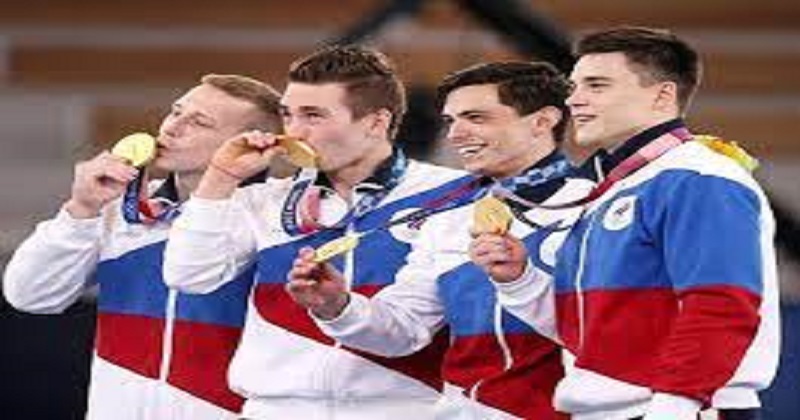
At the 2020 Tokyo Olympics, 335 sportspersons from Russia will compete against athletes from around the world. Unlike their counterparts, however, the Russians are not allowed to use the name, flag or anthem of their country, and are competing under the acronym ROC, which stands for Russian Olympic Committee. All of their medals are listed next to the name ROC in the medal tally for 2020, with a flag that is different from Russia’s national flag.. It is because Russia, which has historically been one of the world’s top sporting nations, has been barred from the Tokyo Olympics.

Russia has been ‘banned’ from the Tokyo Olympics 2020. Why?
The World Anti-Doping Agency (WADA) had banned Russia for four years in December 2019 from competing in international events including Tokyo Olympics and FIFA World Cup 2022. The ban was enacted after new details emerged about a doping program that Russia had been accused of. Over the years, whistleblowers and investigators have complained about Russia’s sophisticated doping program, which forced international federations to ban Russian athletes from participating in major sports events.
WADA lifted the sanctions in September 2018 on the condition that Russian doping regulators receive data from the Russian laboratory, which could help identify hundreds of athletes who may have cheated across various sports. It was then alleged that Russia had manipulated that database, which led to the WADA panel suggesting the four-year ban.

Russia’s original accusations
The former Russian Anti-Doping Agency employee, Vitaly Stepanova, and 800m runner Yulia Stepanova walked into a German documentary to shed light on what was later described as one of the most sophisticated doping schemes in sports history. Another whistleblower – Grigory Rodchenkov, former head of the RUSADA – told The New York Times that Russia ran a state-sponsored doping scheme. Rodchenkov’s claims were even more damning.
During the 2014 Sochi Winter Olympics, he revealed a wider conspiracy by members of the country’s anti-doping agency and intelligence services to substitute urine samples. According to investigations, the lab was guarded by members of Russia’s state security services. The International Olympic Committee (IOC), WADA and other global federations then launched investigations.
Then what did the authorities do?
The accreditation of Russia’s anti-doping lab was suspended immediately after the allegations surfaced. 111 Russian Olympic athletes, including the entire track and field team, were removed from Russia’s 389-member contingent for the Rio Olympics after preliminary investigations. In response to an in-depth investigation, the IOC proposed banning Russia from participating in the Pyeongchang Winter Games. A total of 168 athletes were allowed to participate outside of their federations through special dispensations. There was no official display of the Russian flag at any of the venues, and the Russian Olympic Committee was prohibited from attending the event. Russian athletes were also made to wear neutral uniforms bearing the words, ‘Olympic Athlete From Russia’.

What happened next?
The Court of Arbitration for Sport (CAS) reduced the initial ban of four years to two in 2020, but it still ensured that no official Russian team could participate in a WADA sanctioned event until December 16, 2022. The official Russian teams are now out of the 2020 Summer Olympics, the Paralympics in Tokyo next year, as well as the Winter Olympics in Beijing. If Russia qualifies for the World Cup in Qatar in 2022, it will have to compete under a neutral name. During the ban period, Russia is also prohibited from hosting any world sporting event whose governing body is registered with WADA. According to a report published in The Independent, if Russia meets and observes all sanctions, pays its fines and contributions, and adheres to WADA regulations after the ban expires, it will be reinstated.
Read more: ‘Proof of being un-vaccinated required’: Restaurant takes strange decision after anti-mask policy
Is the ‘ban’ effective?
Although the ban is not outright, there are still 335 Russian athletes competing at Tokyo under the name ROC, the Russian Olympic Committee, which has representatives at every Games. The ‘punishment’ consists only of not using Russia’s name, flag, or national anthem. To USA Today, WADA President Witold Ba?ka said, ‘We at WADA remain disappointed that CAS has reduced the level of sanctions from four years to two years and allow the Russian athletes to compete with the colors of their flag on their uniforms’.
ROC players are only those who have been able to prove that they were not involved in the doping scandal. According to the IOC, ‘All public displays of an organization’s participant name should use the acronym ROC, not the full name ‘Russian Olympic Committee’. On any kit of an athlete that has the name ‘Russia’, the words ‘neutral athlete’ must also appear. As per IOC guidance, athletes must still wear the country’s colours’, the Independent reported.

Post Your Comments